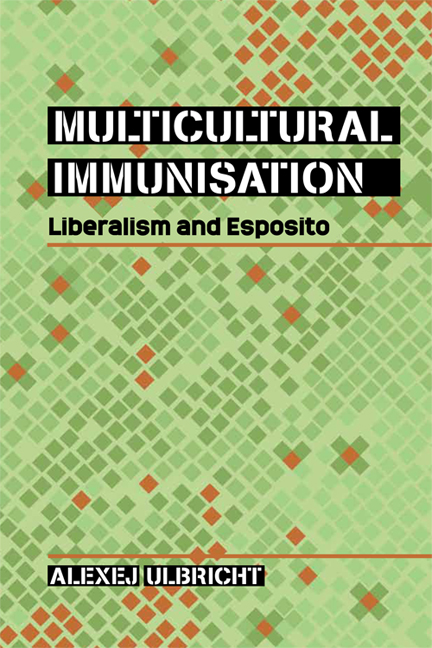Book contents
- Frontmatter
- Contents
- Acknowledgements
- 1 Introduction
- 2 Liberal Thought on Multiculturalism
- 3 Multiculturalism as a Mode of Immunising the Body of Liberalism
- 4 Liberal Multiculturalism and Rights: Citizens, Humans and Other Subjects
- 5 Disagreement and the Horizons of Consensus
- 6 Recognition: Tolerant, and Cunning
- 7 Multiculturalism Beyond Immunity
- 8 Conclusion
- Bibliography
- Index
4 - Liberal Multiculturalism and Rights: Citizens, Humans and Other Subjects
Published online by Cambridge University Press: 05 August 2016
- Frontmatter
- Contents
- Acknowledgements
- 1 Introduction
- 2 Liberal Thought on Multiculturalism
- 3 Multiculturalism as a Mode of Immunising the Body of Liberalism
- 4 Liberal Multiculturalism and Rights: Citizens, Humans and Other Subjects
- 5 Disagreement and the Horizons of Consensus
- 6 Recognition: Tolerant, and Cunning
- 7 Multiculturalism Beyond Immunity
- 8 Conclusion
- Bibliography
- Index
Summary
In this chapter I will be looking at the importance of ideas of citizenship and human rights for liberal multiculturalism. A look at some of the antinomies and exclusions present in these discourses will show that these are carried over into liberal multiculturalism. This is necessarily so, because multiculturalism celebrates these doctrines as a success, and reproduces the problems that arise from them with gusto. What is being promoted in both these areas is a certain conception of the subject and a legalistic stress on rights. I will argue that the practices of discourses of civic and human rights in fact constitute an immunitary operation that strengthens the body of liberalism. In order to look at these processes I will first turn to the issue of citizenship. Starting with how it features in liberal multiculturalism, and will then look at some of its antinomies, drawing especially on the work of Étienne Balibar. I will then turn towards human rights. I will argue that human rights discourse has to be seen in conjunction with citizenship and multiculturalism, both because liberal multiculturalists advocate both and because there are certain exclusions at work in human rights discourses that are connected with citizenship – or rather, that it utilises inclusion and exclusion in a way that can best be understood as immunitary. This will necessitate looking at the deployment of human rights and at how they are exclusive in terms of both their conception and their praxis.
While it may at times seem as if we are moving away from the topic of multiculturalism, it in fact always remains there in the background. The exclusions of citizenship and human rights discourse belie certain aspects of liberal multiculturalism, for in its celebration of human rights and citizenship it necessarily supplements certain exclusions into itself. In terms of liberal theorists, my focus in this chapter will be on Kymlicka, not because his work is solely determined by the notion of citizenship and rights discourse, nor because he is the only liberal theorist of multiculturalism who focuses on these things, but rather because in Kymlicka we can see a very good example of the kind of work rights and citizenship discourse performs in liberal multiculturalism.
- Type
- Chapter
- Information
- Multicultural ImmunisationLiberalism and Esposito, pp. 66 - 88Publisher: Edinburgh University PressPrint publication year: 2014



